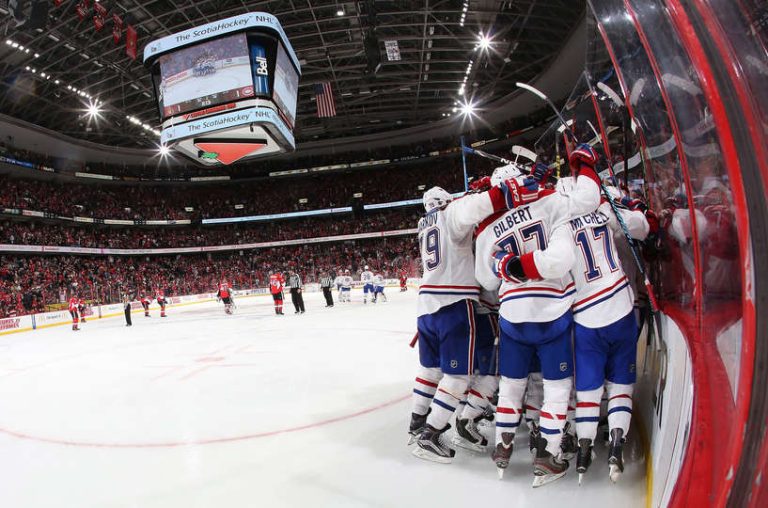
by Shannon Penfound, Staff Writer and Event Coordinator, All Habs Hockey Magazine

WINNIPEG, MB. — As expected, the match-up between the Montreal Canadiens and Ottawa Senators has been intense. Though the Canadiens are leading the series 3-0, not much matters until that fourth win is secured. You can catch the Game 3 recap here.
I don’t want to discuss the specifics of the Subban – Stone ‘slashgate’ in too much detail, as I feel it has been drawn out enough. That being said, what this incident has done is force me to consider how such controversial events may help or hinder player performance in high-stress situations, such as the Stanley Cup Playoffs. More importantly, how do teams rally together in order to push past distracting events?
The Montreal Canadiens understand adversity and the need to work together through such moments as a team. When fans got word that the Habs’ best forward, Max Pacioretty, would not be playing in the few remaining games leading up to the first round of the playoffs, many wondered how the rest of the team would respond offensively.
“Patch is a huge part of our team. It’s tough to replace him. It’s an opportunity for the guys to step up and show what they can do.” – Andrei Markov1
It was during the first game of the series, already down Pacioretty, when P.K. Subban was called for a five minute major and a game misconduct, adding insult to injury. The Habs went on to win that game, courtesy of some unsuspecting players, like Torrey Mitchell (1G) and Brian Flynn (1G, 2A). Lars Eller also had a beautiful short-handed goal that game, further proving that this team may over-rely on some of their sharp-shooters like Subban and Pacioretty, but are certainly more than capable of contributing offensively when needed.

Following the on-ice incident, many things were said, rumours swirled, and the focus shifted towards the very sincere rivalry that exists between the Canadiens and Senators. What was most important was how the players responded to the various criticisms and stories that were circulating amongst the fan bases and across the media.
Focus
“We’ve just got to focus on what we can control. That’s how we play.” – P.K. Subban2
Ask just about any NHL’er if they have a key to high performance and they will say something related to an ability to ‘focus’ on the task at hand. Concentration typically contains four parts3:
- Focusing on the relevant cues in one’s environment
- Maintaining that focus over time
- Having awareness of the situation and performance errors
- Shifting focus when necessary
Call it confidence, mental skills, or maturity – the ability to remain focused on the important aspects of your game, while remaining un-phased by the things you cannot control, helps lead to an increase in performance. No one does this better than Montreal Canadiens’ goaltender, Carey Price. Price is consistently placed in high-stress game situations, has bounced back from various injuries, and is required to deal with the Montreal media circus day in and day out, and he does all of this with a sort of zen-like composure I have never witnessed before. However, even though this is a fairly young group, their maturity, confidence, and ability to remain focused through controversy and adversity remains evident.

Camaraderie
“We had a great bunch of fellows. It’s probably one of the main reasons why we had so much success here in this room. We had a great family atmosphere among the players. When somebody was going through a difficult time, we would all rally around him. If it was on the ice, and sometimes personal problems, the players would be there to help because we knew that if he wasn’t performing according to what the player was able to produce, it would directly benefit all of us (to help that player through it.)” – Jean Beliveau4
It has been argued that teams who have high internal social support amongst players see improvements in player’s stress levels, lowered risk of burnout amongst players, and increased feeling of team cohesion3. None of this should come as a surprise. As Jean Beliveau stated, when a player is dealing with an issue, it helps when his teammates rally together with him to help him work through whatever may be stealing his focus. In this respect, I argue that a player’s ability to focus and the camaraderie felt amongst teammates can be directly linked.

The ‘slash’ incident made it apparent that Subban’s teammates and coaching staff stood behind him. In fact, Subban had an extra defender in his corner, someone who understood Mr. Beliveau’s wise words all too well, being one of his biggest supporters over their 61 years of marriage.
While the Montreal Canadiens are no strangers to controversy and the spotlight, what matters most is how the team addresses issues together. Whether linked to one player in particular, or relevant for the team in its entirety, maintaining their tight-knit ways will help the players move past distracting events and maintain their focus on the task at hand: the drive for 25.
- Andrei Markov, first intermission interview aired on Sportsnet, April 9, 2015.
- RAW PK Subban Retrieved from http://video.canadiens.nhl.com/videocenter/console?id=811125&catid=66
- Weinberg, R.S., & Gould, D. (2011). Foundations of Sport and Exercise Psychology. (5th). Champaign,IL: Human Kinetics.
- A James Tallmar Video for The Canadian Journey 2017 Project. Retrieved from https://youtu.be/wChnwODRAwI on April 19, 2015.